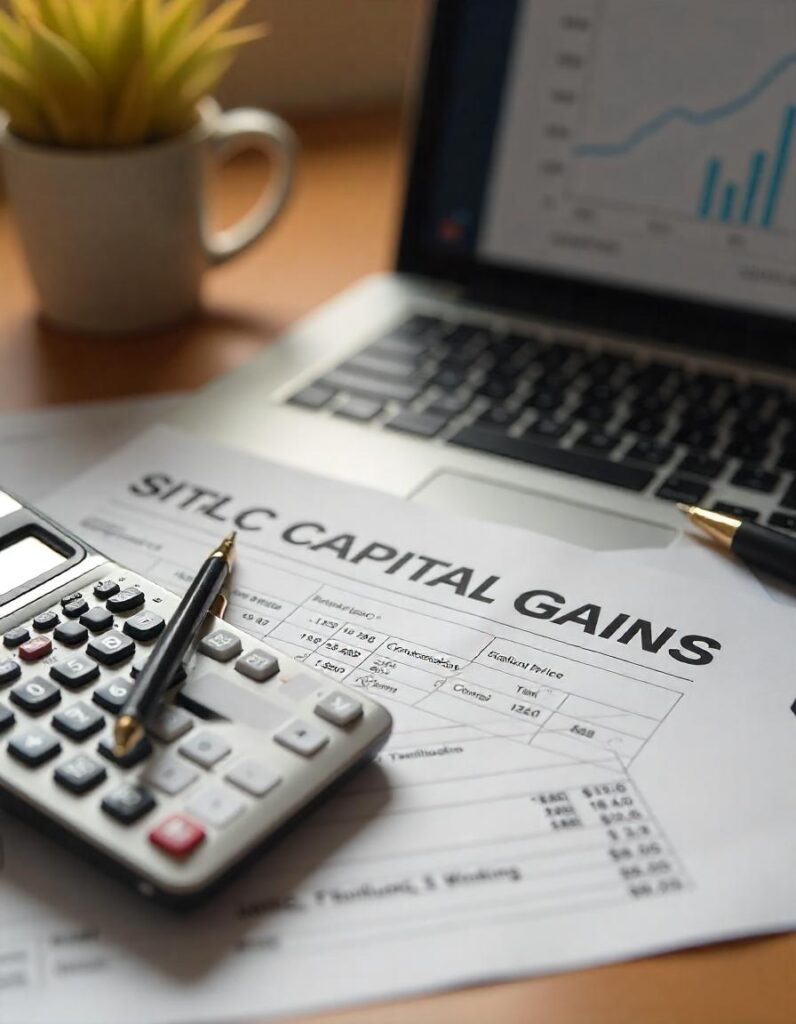Capital Gains Tax Calculator
Capital Gains Tax Results
Asset #1
Multiple Assets Tax Results
How to Use This Calculator
This capital gains tax calculator helps you estimate the taxes you’ll owe on profits from selling assets like stocks, real estate, or other investments.
Instructions:
- Standard Calculator: Use this for calculating tax on a single asset sale.
- Multiple Assets: Use this if you sold multiple assets in the same tax year.
- Enter the purchase price (cost basis) and sale price of your asset.
- Include any expenses like commissions, fees, or improvement costs.
- Select your holding period (short-term or long-term).
- Provide your filing status and annual taxable income for accurate tax rate calculation.
Understanding Capital Gains Tax
Capital gains tax is levied on the profit from the sale of an asset. Rates differ based on:
- Short-term gains: Assets held less than 1 year are taxed as ordinary income.
- Long-term gains: Assets held 1 year or more benefit from lower tax rates (0%, 15%, or 20%).
Additional Resources
Learn how to calculate capital gains tax on stocks and real estate with examples, formulas, and expert tips.
Capital Gains Tax Calculator: A Complete Guide

Ever sold a stock or a house and made a nice little profit? Congrats—but don’t start planning your yacht party just yet. Uncle Sam (or your local tax authority) might want a slice of that pie. That’s where capital gains tax comes in.
This guide is your no-fluff, no-jargon walkthrough of how capital gains tax works, how to calculate it, and how to avoid costly mistakes. Let’s dive in!
What is Capital Gains Tax?
Capital gains tax is a tax you pay on the profit when you sell an asset—like stocks, real estate, or even cryptocurrency—for more than you paid for it.
Short-Term vs. Long-Term Capital Gains
Think of short-term gains like your weekend romances—taxed higher and less rewarding. If you hold an asset for less than a year before selling, that’s a short-term gain. Anything longer? That’s a long-term gain and usually taxed at a lower rate.
Why Should You Care About Capital Gains?
Because the IRS (or your country’s taxman) certainly does! Misreporting gains can lead to penalties. Plus, if you’re smart about it, you can keep more money in your pocket legally.
How Capital Gains Tax is Calculated
The Basic Formula
Capital Gain = Selling Price – Purchase Price (Cost Basis)
Pretty straightforward, right? But there’s more…
Step-by-Step Breakdown
- Find the Cost Basis – What you paid, including commissions or fees.
- Add Capital Improvements – Especially for real estate.
- Subtract Selling Costs – Commissions, closing fees, etc.
- Apply the Holding Period – Determines short or long-term tax rate.
- Apply Tax Rates – Based on your total income and filing status.
Capital Gains Tax on Stocks

Let’s say you bought 100 shares of Company ABC at $20 each and sold them a year later for $50.
- Purchase Cost = $2,000
- Selling Price = $5,000
- Capital Gain = $3,000
If you held it for more than a year, that’s a long-term gain. Depending on your tax bracket, you might pay 0%, 15%, or 20% federal tax in the U.S.
Capital Gains Tax on Real Estate
Primary Residence vs. Investment Property
If it’s your primary home and you’ve lived there for 2 of the last 5 years, you might be exempt up to $250,000 (single) or $500,000 (married).
For investment properties, no such luck—you’re taxed like it’s a business deal.
Example: Selling a Rental Property
- Bought at $200,000, sold at $300,000
- After deductions and improvements, gain = $80,000
- If long-term, you may owe 15% → $12,000 tax bill
Understanding Cost Basis
This is more than just what you paid. Include broker fees, transaction costs, and improvements (for property).
- Stocks: Include brokerage commissions.
- Real Estate: Include renovations that added value.
Capital Gains Tax Rates (U.S.)
Federal Tax Brackets (2024 Long-Term)
- 0% – If income < $44,625 (single)
- 15% – If income $44,626 – $492,300
- 20% – If income > $492,300
State-Level Taxes
Some states (like Florida, Texas) have no capital gains tax. Others (like California, New York) tax gains as regular income.
International Comparison: UK, Canada & Australia
- UK: Annual exemption (~£6,000), tax is 10–20%
- Canada: 50% of gain is taxable at your marginal rate
- Australia: 50% discount on long-term assets (held >1 year)
Capital Losses: Can They Help You?
Yes! If you sell at a loss, you can offset gains. Up to $3,000/year in excess losses can be deducted from regular income.

Capital Gains Tax Exemptions & Deductions
- Primary residence exclusion (U.S.)
- 1031 exchanges for real estate
- Retirement accounts like Roth IRA (tax-free gains)
- Carryforward of capital losses
Special Rules for Cryptocurrency Gains
Crypto is treated like property. Every time you swap or sell, it could trigger a capital gain. Keep records!
Tools & Resources: Free Capital Gains Tax Calculators
Try these reliable calculators:
- NerdWallet Capital Gains Tax Calculator
- SmartAsset Capital Gains Calculator
- IRS Capital Gains Worksheet (PDF)
Capital Gains Tax Calculator Table (Examples)
| Asset Type | Buy Price | Sell Price | Gain | Holding Period | Est. Tax (U.S.) |
|---|---|---|---|---|---|
| Stocks | $2,000 | $5,000 | $3,000 | >1 year | $450 (15%) |
| Real Estate | $200,000 | $300,000 | $80,000 | >1 year | $12,000 (15%) |
| Crypto | $1,000 | $3,000 | $2,000 | <1 year | $600 (30%) |
Tips to Legally Minimize Capital Gains Tax

- Hold assets for over a year
- Use tax-deferred accounts
- Harvest losses strategically
- Gift assets to lower-income family members
- Invest in Opportunity Zones
Mistakes to Avoid When Filing Capital Gains
- Forgetting to report cost basis
- Ignoring reinvested dividends
- Not keeping transaction records
- Selling in a high-income year
- Failing to report crypto trades
Conclusion: Don’t Let Capital Gains Catch You Off Guard
Taxes can feel like a financial booby trap, but once you understand how capital gains work, you’re in control. Use a calculator, keep records, and be smart about when and how you sell. It’s not just about making money—it’s about keeping it too.
FAQs: Quick Answers to Common Questions
1. How do I calculate capital gains tax myself?
Subtract your cost basis from your selling price, then apply the appropriate tax rate based on how long you held the asset.
2. Are there any tools to help with this?
Yes! Try online calculators from NerdWallet or SmartAsset, or consult a tax advisor.
3. Do I owe taxes if I don’t cash out my stocks?
No. You only owe capital gains tax when you sell and realize a gain.
4. Is my home sale always taxable?
Not if it’s your primary residence and you meet ownership and use tests—you may be able to exclude up to $500,000 of gain.
5. Can capital losses reduce my tax bill?
Yes. They can offset gains and even reduce regular income by up to $3,000 per year.
